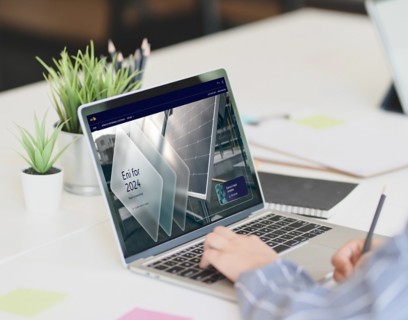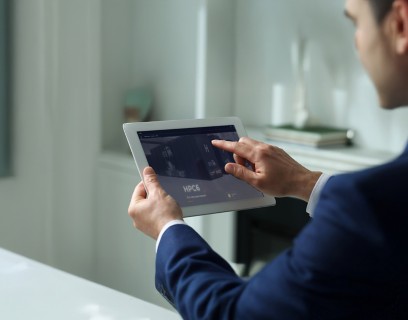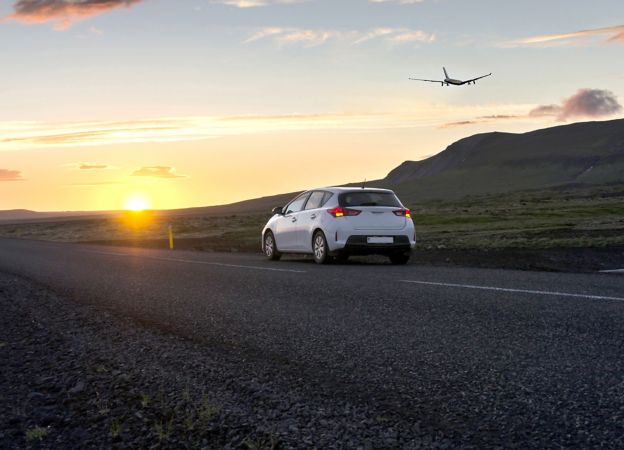The data on this page will be updated following the presentation of the Eni’s Strategic Plan 2025-2028.
Hydrogen, the potential of an energy vector
The path to decarbonisation also includes H₂.

The role of hydrogen in the energy mix
Hydrogen could contribute significantly to decarbonization. In order to express the full potential of this valuable energy vector, we are using complementary and non-competing production technologies according to the principle of technological neutrality. An effective strategy must recognise the contribution to decarbonisation that all forms of low-carbon hydrogen can make.
What is hydrogen?
Highlights
Claudio Descalzi
Chief Executive Officer of Eni

Our activities in hydrogen
We are one of the largest producers and consumers of hydrogen in Italy. To date, the element is mainly used as feedstock in traditional refining processes as well as in the biorefineries in Venice and Gela to produce HVO biofuels, i.e. the hydrotreated vegetable oils ideal for sustainable mobility.
Hydrogen in refineries and biorefineries is used directly in production processes and produced mainly through a technology that has been established in the industry nowadays: Steam Methane Reforming (SMR). Low-carbon hydrogen is also a solution for the decarbonisation of highly energy-hungry industries with hard-to-abate process emissions, where electrification is not currently a viable or decisive option.
Our hydrogen projects
The processes and technologies we are developing to produce and utilise this energy vector.
Power plants
With Edison and Ansaldo Energia, we are experimenting with the production of hydrogen to be used as a substitute for methane at the new Edison power station in Marghera. The hydrogen used is either 'green', the conventional term for hydrogen obtained from water by electrolysis from renewable sources, or 'blue', i.e., produced from methane, but with the capture of the CO2 emitted in the process.
Carbon Capture and Storage (CCS) Systems
We want to produce blue hydrogen, i.e. by means of steam reforming plants for natural gas combined with the capture of CO₂ generated by the production process. This way, we want to reduce the carbon footprint of the hydrogen used as feedstock in our plants, also with a view to the progressive decarbonisation of our energy products. The aim of CCS is actually primarily to reduce CO₂ emissions from heavy industry (refining, iron and steel, glass, chemicals, cement factories, etc.), while also fostering the development of a blue energy chain (blue hydrogen and blue electricity). In Italy, there is a unique opportunity to produce blue hydrogen in the Ravenna area, thanks to the implementation of the 'Ravenna CCS' project, which, by exploiting the combination of depleted offshore gas fields with infrastructure that is still in working order, will provide a safe storage site for all industrial emissions in the area.
kGas
We are developing kGas, a technology for converting natural gas into synthesis gas, i.e. the mixture of hydrogen and carbon monoxide that constitutes a valuable source of H₂ through catalytic partial oxidation of natural gas. In addition to being a more energy efficient system than the ones that are available on the market, kGas is able to produce synthesis gas and hydrogen with a strong reduction in CO₂ emissions, possibly using biomethane as a feedstock. This process could be a candidate to become the technology of choice for blue hydrogen production, as it enables CO₂ capture with greater efficiency.
Waste to Hydrogen
At the Venice refinery, we are evaluating the implementation of the Waste to Hydrogen project, based on an innovative gasification technology: a process for the production of sustainable hydrogen through the gasification of non-recyclable waste, i.e. Plasmix¹ and CSS ², waste that is currently used in waste-to-energy plants or sent to landfills. This process enables the production of sustainable H₂ in synergy with refining plants, helping to reduce emissions associated with conventional waste treatment and conventional hydrogen production. With an on-site gasification system for hydrogen production, a 90% saving in greenhouse gas emissions is achieved compared to hydrogen production by steam reforming. The GHG saving calculation is made on a LCA (life cycle analysis) basis and takes into account the emissions avoided by using waste as feedstock in the Waste to Hydrogen project instead of as feedstock in a conventional waste-to-energy plant.
1) Plasmix: sorting waste by collecting plastics separately
2) CSS: secondary solid fuel, the fraction resulting from the sorting of undifferentiated waste collection in mechanical biological treatment plants
Water electrolysis
We are also developing projects for the production of hydrogen from renewable sources through the water electrolysis (so-called green hydrogen). A collaboration in this area exists between Eni and Enel.
Two projects developed by the South Italy Green Hydrogen Joint Venture set up by the two companies are among the Italian beneficiaries of IPCEI Hy2Use, the European Commission's thirteen-country initiative that will provide up to €5.2 billion for the hydrogen sector. Supported by IPCEI Hy2Use, the South Italy Green Hydrogen's two green hydrogen plants will be built in the Gela bio-refinery and near the Taranto refinery. The electrolysers will have a capacity of 20 MW and 10 MW respectively, both with Proton Exchange Membrane (PEM) cells. The hydrogen they will produce will be obtained exclusively from renewable sources and will contribute to the decarbonization process of the two plants.
Green hydrogen is also part of the collaboration between Cassa Depositi e Prestiti, Eni and Snam for the decarbonisation of the energy system. More specifically, the three companies, in compliance with applicable regulations (primarily unbundling regulations), will promote possible joint initiatives (including partnerships) aimed at the development of green hydrogen production, transport and marketing. The collaboration will also cover the production and use of hydrogen in rail transport, leveraging Eni's expertise in electricity production and renewable energy and Snam's skills in infrastructure and electrolysers, storage and logistic solutions.
H2iseO
We have signed an agreement with Edison and Ansaldo Energia to test the production of hydrogen to be used as a substitute for methane in the new Edison power plant in Marghera. The hydrogen used is either 'green', the conventional term for hydrogen obtained from water by electrolysis from renewable sources, or 'blue', i.e., produced from methane, but with the capture of the CO2 emitted in the process.
Our hydrogen projects
The processes and technologies we are developing to produce and utilise this energy vector.
Power plants
Power plants
With Edison and Ansaldo Energia, we are experimenting with the production of hydrogen to be used as a substitute for methane at the new Edison power station in Marghera. The hydrogen used is either 'green', the conventional term for hydrogen obtained from water by electrolysis from renewable sources, or 'blue', i.e., produced from methane, but with the capture of the CO2 emitted in the process.
CCS Systems
Carbon Capture and Storage (CCS) Systems
We want to produce blue hydrogen, i.e. by means of steam reforming plants for natural gas combined with the capture of CO₂ generated by the production process. This way, we want to reduce the carbon footprint of the hydrogen used as feedstock in our plants, also with a view to the progressive decarbonisation of our energy products. The aim of CCS is actually primarily to reduce CO₂ emissions from heavy industry (refining, iron and steel, glass, chemicals, cement factories, etc.), while also fostering the development of a blue energy chain (blue hydrogen and blue electricity). In Italy, there is a unique opportunity to produce blue hydrogen in the Ravenna area, thanks to the implementation of the 'Ravenna CCS' project, which, by exploiting the combination of depleted offshore gas fields with infrastructure that is still in working order, will provide a safe storage site for all industrial emissions in the area.
kGas
kGas
We are developing kGas, a technology for converting natural gas into synthesis gas, i.e. the mixture of hydrogen and carbon monoxide that constitutes a valuable source of H₂ through catalytic partial oxidation of natural gas. In addition to being a more energy efficient system than the ones that are available on the market, kGas is able to produce synthesis gas and hydrogen with a strong reduction in CO₂ emissions, possibly using biomethane as a feedstock. This process could be a candidate to become the technology of choice for blue hydrogen production, as it enables CO₂ capture with greater efficiency.
Waste to Hydrogen
Waste to Hydrogen
At the Venice refinery, we are evaluating the implementation of the Waste to Hydrogen project, based on an innovative gasification technology: a process for the production of sustainable hydrogen through the gasification of non-recyclable waste, i.e. Plasmix¹ and CSS ², waste that is currently used in waste-to-energy plants or sent to landfills. This process enables the production of sustainable H₂ in synergy with refining plants, helping to reduce emissions associated with conventional waste treatment and conventional hydrogen production. With an on-site gasification system for hydrogen production, a 90% saving in greenhouse gas emissions is achieved compared to hydrogen production by steam reforming. The GHG saving calculation is made on a LCA (life cycle analysis) basis and takes into account the emissions avoided by using waste as feedstock in the Waste to Hydrogen project instead of as feedstock in a conventional waste-to-energy plant.
1) Plasmix: sorting waste by collecting plastics separately
2) CSS: secondary solid fuel, the fraction resulting from the sorting of undifferentiated waste collection in mechanical biological treatment plants
Water electrolysis
Water electrolysis
We are also developing projects for the production of hydrogen from renewable sources through the water electrolysis (so-called green hydrogen). A collaboration in this area exists between Eni and Enel.
Two projects developed by the South Italy Green Hydrogen Joint Venture set up by the two companies are among the Italian beneficiaries of IPCEI Hy2Use, the European Commission's thirteen-country initiative that will provide up to €5.2 billion for the hydrogen sector. Supported by IPCEI Hy2Use, the South Italy Green Hydrogen's two green hydrogen plants will be built in the Gela bio-refinery and near the Taranto refinery. The electrolysers will have a capacity of 20 MW and 10 MW respectively, both with Proton Exchange Membrane (PEM) cells. The hydrogen they will produce will be obtained exclusively from renewable sources and will contribute to the decarbonization process of the two plants.
Green hydrogen is also part of the collaboration between Cassa Depositi e Prestiti, Eni and Snam for the decarbonisation of the energy system. More specifically, the three companies, in compliance with applicable regulations (primarily unbundling regulations), will promote possible joint initiatives (including partnerships) aimed at the development of green hydrogen production, transport and marketing. The collaboration will also cover the production and use of hydrogen in rail transport, leveraging Eni's expertise in electricity production and renewable energy and Snam's skills in infrastructure and electrolysers, storage and logistic solutions.
H2iseO
H2iseO
We have signed an agreement with Edison and Ansaldo Energia to test the production of hydrogen to be used as a substitute for methane in the new Edison power plant in Marghera. The hydrogen used is either 'green', the conventional term for hydrogen obtained from water by electrolysis from renewable sources, or 'blue', i.e., produced from methane, but with the capture of the CO2 emitted in the process.
Hydrogen JRP: a platform for the development of hydrogen-related technologies
In order to boost the creation of a hydrogen supply chain in Italy, together with the Milan Polytechnic Foundation, Edison and Snam, we created the Hydrogen Joint Research Platform (Hydrogen JRP) which is dedicated to the development of hydrogen-related technologies. The main areas identified are:
● clean (green and 'low carbon') hydrogen production
● solutions for its transportation and related advanced storage systems
● innovative electrochemical and thermal applications in residential, industrial and transport applications
● the development of best practices for designing and implementing hydrogen transport and storage infrastructures.
Value for mobility and electricity
Hydrogen is a promising option for sustainable mobility in the medium term, especially for transport sectors that are difficult to decarbonise, such as heavy and long-haul road transport. In the long term, it could also find a use in the maritime mobility sector. However, the development of hydrogen-based transport in Europe is limited by high production and distribution costs, as well as a lack of adequate infrastructure. To overcome these challenges, we have built a hydrogen filling station in Mestre and a second one in San Donato Milanese, where the hydrogen will be produced on site by means of an electrolyser.
In addition, Eni is developing expertise in the combustion of hydrogen and natural gas mixtures in existing gas turbines. This technology aims to increase the percentage of hydrogen used to power Enipower gas turbines, thus enabling low-carbon electricity to be generated.





















